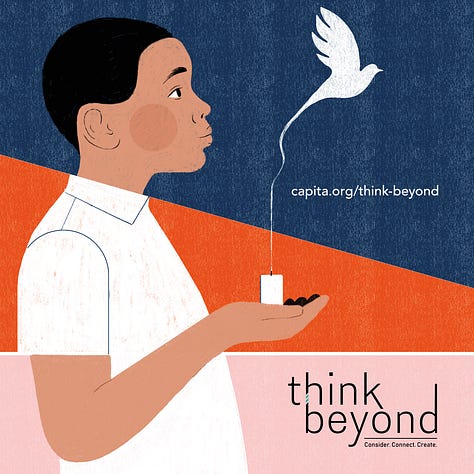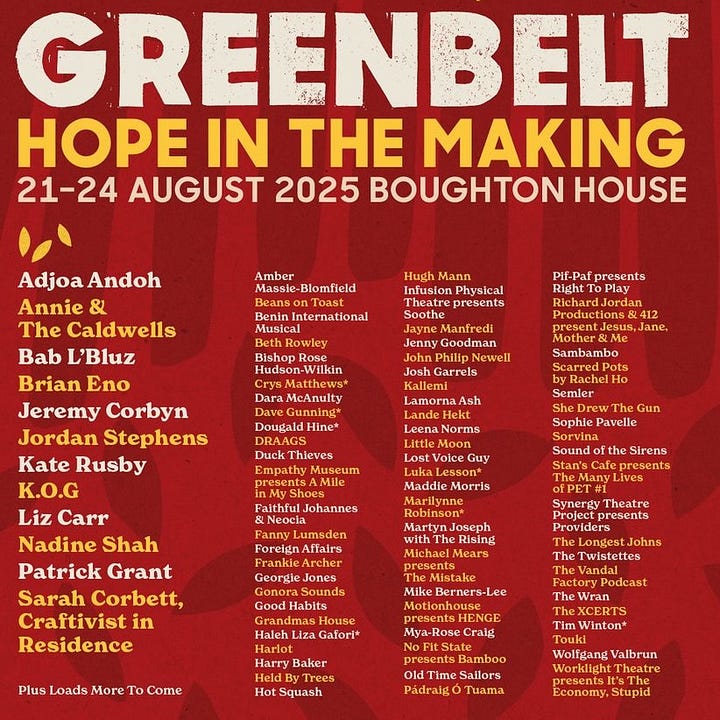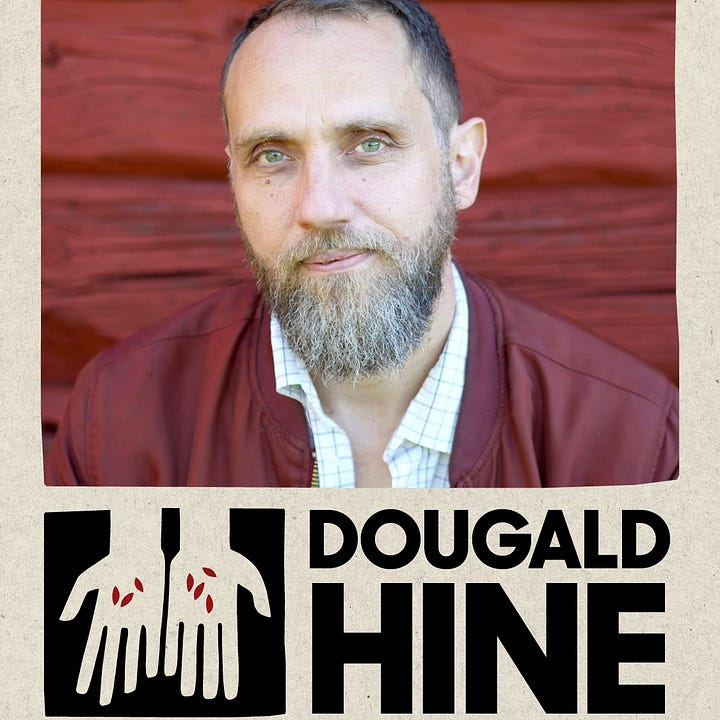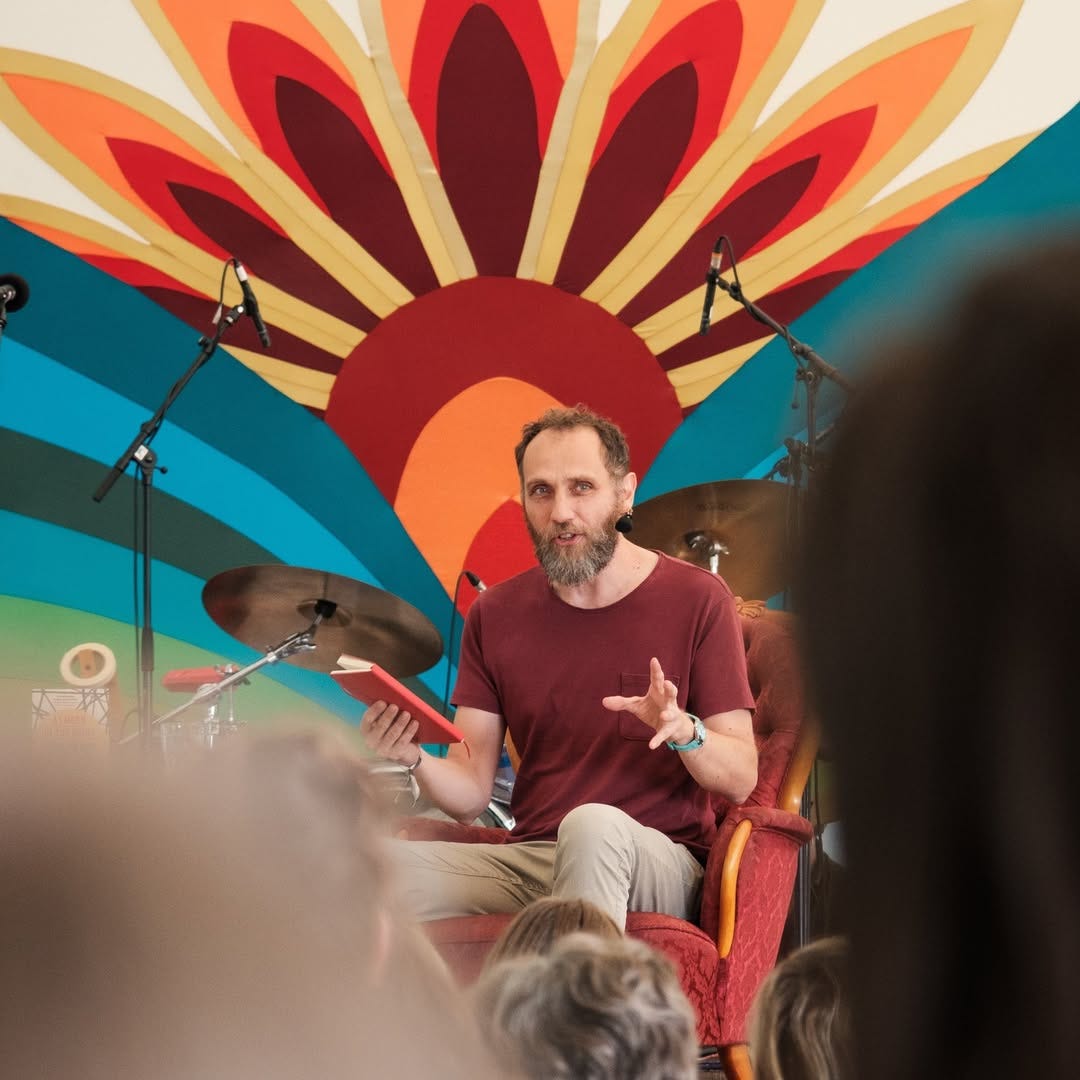The Music Behind the Words
What I've learned from speaking to rooms full of people
A good part of my work involves speaking to rooms full of people. The more at home I’ve become in this situation, the more I have learned to trust the music behind the words as more important than the words themselves.
This is a strange thing to say, because on the surface, what I do can look quite close to what people in certain corners of academia do: tracing lines of thought, connecting ideas, conjuring with some of the same names they might use. But somewhere underneath, I’m navigating by a sense which most academics have been taught to disregard.
“Does it come from you, the music – or is it coming from the room?” The question came from a new friend, Jade Connelly-Duggan, who Anna and I were hanging out with at the Ivan Illich gathering in Italy last month.
I sat with her question for a while without saying anything. That’s something I’ve learned to do, even when there’s a room full of people waiting for a response. Especially then. Wait until I can feel there’s something worth saying.
What came was the story of the years in my late twenties when I spent a lot of time around stand-up comedy clubs. I never tried going on stage, but I learned a lot from the people who did. The first thing I learned is that there’s no middle ground when it comes to the room: either you’ve got the room with you or you’ve lost it. And what is the room, anyway? This will take you quickly off the map of things we’re comfortable with or even have concepts for, because the first job of a stand-up act is to draw together the individual consciousnesses of thirty or sixty or two hundred people, and fuse this into a unified field, a magic carpet on which one person with a microphone can take us all for a ride. There’s a craft to doing this, and there are cheap and reliable ways of deploying its tools, people who make a living using them the same way, night after night, for decades, just as there are artists of the craft who will push it to wild and improbable places. But for any of them, if the carpet unravels and you lose the room, then the spell breaks and we all thud back into our seats. There’s a reason they call it dying.
I don’t tell jokes for a living, but my sense of riding the music behind the words owes a lot to what I learned in those Thursday-night comedy clubs. So yes, it’s about listening to the room, not by handing out audience questionnaires, but through a navigational device that seems to be located somewhere near the intestines.
We were having this conversation in a little circle on the terrace, in between lunch and the afternoon session. Someone asked if I get challenged about being a middle-aged white guy who gets to do the talking while everyone else listens, in a time when this set-up is no longer taken for granted. Surprisingly rarely, is the honest answer, though I take the question seriously.
My sense is that the reason this kind of challenge rarely comes up is that, if I’m playing my part and listening for the music, then despite the demographic similarities, I won’t be reproducing the patterns associated with the “sage on the stage”. Something else is happening, something that doesn’t come from me.
What strengthens my sense of this is that, on those occasions when I do get this kind of challenge, it’s almost always the case that something else has already gone wrong. Maybe the room is set up badly, so it’s impossible to make eye contact with anyone beyond the front row, or maybe I didn’t sleep the night before. If I’m on tour for three weeks, there will be one night when it goes like this, two at the most – but I’m the only person in the room who was there all the other nights, and all the audience has to go on is what’s happening here and now. So someone will speak up from a true sense of discomfort, and what they say may take the form of a “call-out”, speaking to the truth of other experiences they have had, patterns they are tired of – with good reason – and which they find echoed in what’s happened in the room so far tonight.
When a question like that comes, my job is to slow down. Take a breath, let the change in the temperature of the room call in what’s been missing from the way I was showing up until now. Because if I can be there, on the receiving end of what could feel like a verbal hand grenade, and not go into fight or flight or fawn, then this can be the moment that saves the night, the point at which something happens that makes it worth us all being here together, the rupture through which a gift arrives. Between us, we can rewrite the script.
The impro teacher Keith Johnstone used to say that one of the most generous moves you can make in a room full of humans is to be on stage and have things go wrong and not try to hide it, not crumble under it, just be OK with it. I’ve never done theatre impro, any more than I’ve done stand-up comedy, but I’ve carried that bit of Johnstone’s teaching with me and sought to live by it.
So yes, a good part of my work involves speaking to rooms full of people: both in the sense that I’m lucky enough to make a significant portion of my living in this way, but also because there are few things that feel better, few situations in which I feel more alive, even on the nights when things take an unexpected turn.
I started writing this note after a call last week with the organisers of an event where I’ll be giving the keynote this autumn. We’d talked about the language of these things, whether a bleached-out term like “keynote” has any life left in it, and it struck me that we might take it back to its musical roots and this sense of listening for the music behind the words.
If I had the knack of self-promotion, I suppose I’d write a piece like this at a moment when I was looking to drum up business! But the truth is, I’ve said no to almost all the speaking invitations that came my way so far this year, because there’s a book that needs writing.
What I can do, though, is share news of the three invitations I accepted, over the rest of 2025, in case you’re able to join for one of these.
Thanks for reading – and for your support – and a special shout-out to
, whose post, ‘The Words Don’t Work’, stirred my thinking about all of this in recent weeks. Here’s Lydia and me weaving words together in front of a room full of people on my At Work in the Ruins tour a couple of years ago.Wayfinding in the Ruins of Now
July 17 – online event – 9am ET / 3pm CEST



The think tank Capita have invited me to give the opening keynote of Think Beyond, a two-year journey which will include online and in-person gatherings:
This journey is for people shaping the future of families and their communities, including parents, policymakers, community builders, artists, funders, grassroots organizers, educators, philosophers, faith leaders, and entrepreneurs. Participants may be based anywhere in the world. What unites them is not job title or institutional affiliation but a shared commitment to rethinking what it means to lead, care, build, and imagine in grounded, courageous, and generative ways.
If that sounds like you, then you’re invited to join the free opening event on Zoom next Wednesday. Register here.
(And if you’re wondering whether and how the flow between speaker and audience that I’ve been writing about can happen when we’re all scattered in different places in front of screens, well that’s something I’ve wondered about too. You can read some reflections related to this in ‘Gathered and Scattered’.)
The Work in the Ruins @ Greenbelt Festival
August 23 – in-person & online – 11am BST


For several years now, the organisers of Greenbelt have invited me to speak, and the timing has never been right. One year soon, I hope to take part in person, but this year I will be joining remotely on the Saturday morning to speak to an audience gathered at the festival site. For those elsewhere, there’s a chance to follow this and other sessions with a No Fly Zone ticket to the Greenbelt livestream. Full details of the festival here.
Rotterdam Change Days
November 7-9 – Rotterdam, Netherlands
The one event I’ve agreed to leave home for in the second half of 2025 is a three-day gathering in the Netherlands called the Rotterdam Change Days. The theme for the whole event takes my book, At Work in the Ruins, as its starting point, and I’ll be giving the keynote on the Saturday morning. Full details here.



Your comment on my essay has walked around with me for a couple of weeks. I’ve been noting the temperature in the room and being curious about whether there’s a thing worth saying in response, but it’s all been wordless. And now THIS has arrived, I think this might’ve been the thing worth saying all along 😉 Always a pleasure to weave with you, D.x
"I have learned to trust the music behind the words as more important than the words themselves". Love this! First time I saw your documentary I was deeply moved because of the "music" behind the words. Like I feel it more than intellectually take it in. You are a rebel poet. Your language is exquisite. Feels like your word music capture things deep inside me that I have not been able to capture myself. Very liberating. And deeply moving. Thank you!